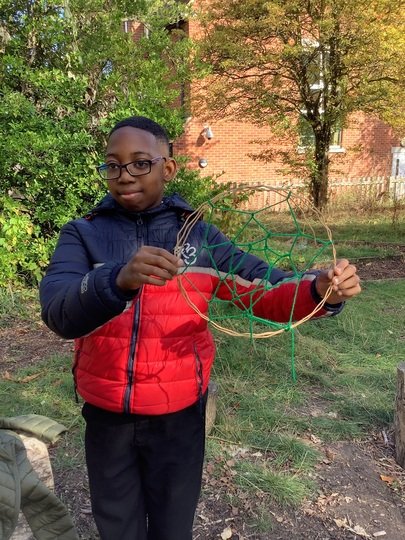
What is Forest School?
Forest school has its roots in the Scandinavian way of living 'Friliftsliv' - free air life. It was first introduced in the UK by a group of nursery nurses from Bridgwater college in Somerset. They traveled to Denmark to look at the pre-school system in place there, which is largely outdoor, child centred and play based. The group were inspired by what they had seen and installed the ideas and learning into their own college pre-school. This has now expanded across the country and Forest schools can be found in all counties and in many schools.
Forest school is a long term, child-led learning process offering opportunities for holistic growth through regular sessions. These session offer the children a safe, non judgemental environment where they can take risks confidently and build their self belief, confidence and resilience. It also enables the children to build a connection to the world around them and understand their place within it.
A year in Forest school
Some of our children have been challenged with the task of photographing Forest school each week. Watch how Forest school changes over the school year.
Holistic Growth
Holistic growth is the overall development of a persons Mind, Body and Spirit not just their educational growth. Holistic development is made up of: SMILES
Spiritual: This is seperate from religion or belief systems and helps give our children a perspective on life, a sence of being part of something bigger.
Motor: helps develope the childrens fine and gross motor skills, through running, climbing, tool work and knot tying. It also help to develope their brain- body connection.
Intellectual: considered important in the classroom, this is the area of problem solving, thinking and understanding concepts. Forest school helps develop a range of different thinking skills and the ability to learn from experience and information.
Linguistic: develops the children's speech, language and communication skills by learning new vocabulary and communicating with others to solve problems, work together as a team to build a den or share their knowledge with others.
Emotional: being able to recognise, understand and regulate our emotions. There are many ways that forest school supports our children in learning about their and others emotions, from our mindful check in at the start of each session, taking risks when trying new activities, to understanding the needs and taking care of the wildlife and others in forest school.
Social: developes our childrens ability to successfully interact and form relationships with others and the world around us. Forest school through its child-lead, play based ethos offers unlimited oppertunities for social development.
Wellbeing
Over the last couple of years, it has become more apparent than ever how important it is to take care of our own and our children's Mental health and Wellbeing. In an age of technology and digital communications we have lost our connection with nature and all the health benefits that it brings with it. There have been many studies on the positive impact that spending time outside and in nature has on us. From the physical impact of being fitter to the change in brain chemicals, reducing the stress related chemicals and replacing them with the natural feel good chemicals.
Forest schools is a child led process that allows the child to follow their own line of investigation at their own pace. This means that the children can take supported risk, in a non-judgemental environment, when they are ready for their new challenge, revisiting the same challenge as often as they want and moving on when they are ready. This process builds the children's confidence, self-esteem, emotional intelligence, resilience, independence and creativity, which over time is transferred throughout all aspects of their life.
What are we up to?
We are starting our year in Forest school by looking at the seasons and the changes it has on our environment. We will also be looking at the different types of trees in Forest school and the school grounds and learning some interest things about them.
This week we have been looking at trees and their leaves. We have been using the leaves to identify the different trees in forest school and have made rubbings of them. Year 6 have made dream catchers and year 4 have added to their dens they started last week, adding seating and swinging shelves. Year 2 have learnt how to pond dip safely and found some interesting things in the pond.
Over this half term we have met our Forest school Robin and listened to him sing to us, we have made Forest school sticks, year 2 have found some some interesting creatures and year 4 are building some amazing dens



























